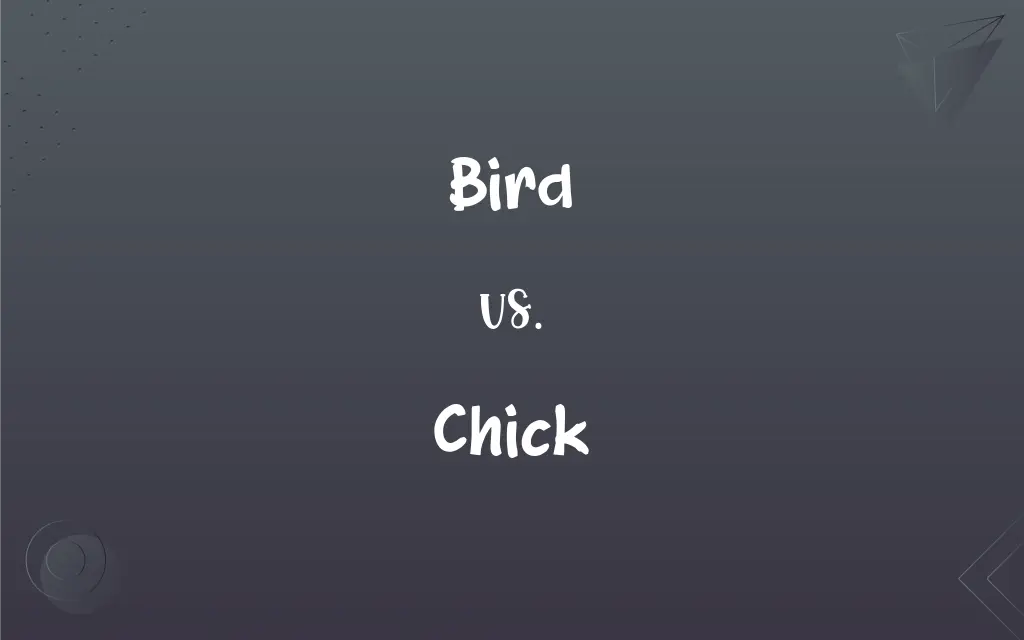Bird vs. Chick: What's the Difference?
Edited by Janet White || By Harlon Moss || Updated on November 12, 2023
Bird refers to any of the warm-blooded, egg-laying, feathered vertebrates with wings. Chick specifically denotes a young bird, especially a newly hatched or very young chicken.

Key Differences
A bird is a general term for a large group of warm-blooded vertebrates known for their feathers, beaks, and ability to lay eggs. A chick, on the other hand, specifically refers to a young bird, most commonly used to describe a baby chicken. Both terms are part of avian terminology but differ in their scope and specificity.
The word bird encompasses a vast variety of species, ranging from tiny hummingbirds to large ostriches. Chick is a more specific term, typically used for young birds that are still dependent on their parents, particularly in the context of domestic fowls like chickens. While every chick is a bird, not every bird is a chick.
In terms of development, birds represent the full spectrum of avian life stages, from hatchlings to adults. Chicks represent only an initial stage in a bird's life cycle, indicating immaturity and youth. The transition from chick to bird marks significant growth and development.
Culturally, the term bird has broader connotations and can be used metaphorically or in idiomatic expressions. Chick, while sometimes used colloquially to refer to young women, is mainly associated with the early life stages of birds, particularly in agriculture and bird-watching contexts.
In ecology, birds play various roles in ecosystems, from seed dispersal to controlling insect populations. Chicks, being young birds, are more vulnerable and dependent, requiring protection and nurturing until they mature. Both contribute to biodiversity, but in different stages of the ecological lifecycle.
ADVERTISEMENT
Comparison Chart
Definition
Any feathered, winged vertebrate
Young or newly hatched bird
Species Variety
Includes all bird species
Limited to young of certain species
Development Stage
Covers all life stages
Refers to early, dependent stage
Usage in Language
Broader, with various connotations
More specific, less varied usage
Role in Ecology
Diverse, depending on species
Primarily dependent, growing stage
ADVERTISEMENT
Bird and Chick Definitions
Bird
Feathered vertebrate.
The robin is a small, colorful bird.
Chick
Baby bird.
We found a chick fallen out of its nest.
Bird
In ornithology.
She studied the behavior of birds in their natural habitat.
Chick
In agriculture.
The farmer raised several chicks in the coop.
Bird
A winged animal.
Birds migrated south for the winter.
Chick
Young chicken.
The chick hatched from the egg this morning.
Bird
In idiomatic expressions.
He's an early bird, always up with the sunrise.
Chick
As a colloquial term.
She's taking care of her little chicks at home.
Bird
As a symbol.
The eagle is a bird that symbolizes freedom.
Chick
In developmental stages.
The chick is still too young to fly.
Bird
Any of various warm-blooded egg-laying feathered vertebrates of the class Aves, having forelimbs modified to form wings.
Chick
A young chicken.
Bird
Such an animal hunted as game.
Chick
One of the young of any bird.
Bird
Such an animal, especially a chicken or turkey, used as food
Put the bird in the oven.
Chick
A child.
Bird
(Sports) See shuttlecock.
Chick
A young bird.
Chick
A young chicken.
Chick
A young child.
Chick
A friendly fighter aircraft.
Chick
A screen or blind made of finely slit bamboo and twine, hung in doorways or windows.
Chick
(obsolete) To sprout, as seed does in the ground; to vegetate.
Chick
To compress the lips and then separate them quickly, resulting in a percussive noise.
Chick
To sprout, as seed in the ground; to vegetate.
Chick
A child or young person; - a term of endearment.
Chick
A young woman; - often considered offensive.
Chick
Young bird especially of domestic fowl
FAQs
What is a bird?
A bird is any warm-blooded, feathered vertebrate with wings and a beak.
What's the main difference between bird and chick?
'Bird' is a broad category, while 'chick' specifically refers to young birds.
Are all chicks birds?
Yes, all chicks are birds, but not all birds are chicks.
Can chick refer to other species besides chickens?
Yes, it can refer to the young of other bird species as well.
What is a chick?
A chick is a young bird, particularly a baby chicken.
Is chick a scientific term?
It's more of a common term, though used in scientific contexts for young birds.
Is the term chick ever used in a non-avian context?
Colloquially, it can refer to young women, though this usage is informal.
Can the term chick refer to any young bird?
Generally, yes, though it's most commonly used for chickens.
How long does a bird remain a chick?
This varies by species, but generally until it can fend for itself.
Do all bird species have chicks?
Yes, in the sense that all birds have a juvenile stage.
Can the term bird have different meanings?
Yes, it can be used metaphorically or in idiomatic expressions.
How do bird and chick differ in terms of vulnerability?
Chicks are generally more vulnerable and dependent than adult birds.
Can the terms bird and chick be used interchangeably?
Not accurately, since chick refers specifically to young birds.
Are there cultural differences in the use of bird and chick?
Yes, usage and connotations can vary culturally.
Are the dietary needs of birds and chicks different?
Often yes, as chicks may require more protein-rich diets for growth.
How do language and regional differences affect these terms?
Usage and connotations can vary, but the basic definitions remain consistent.
Is it common to use chick for species other than chickens?
It's less common but still correct in a broad sense.
Do bird and chick have different roles in the ecosystem?
Yes, based on their stages of life and development.
Do bird and chick differ in terms of behavior?
Yes, chicks often exhibit more dependent behaviors.
Are birds and chicks equally represented in birdwatching?
Birdwatchers often observe both, though adult birds may be more prominently featured.
About Author
Written by
Harlon MossHarlon is a seasoned quality moderator and accomplished content writer for Difference Wiki. An alumnus of the prestigious University of California, he earned his degree in Computer Science. Leveraging his academic background, Harlon brings a meticulous and informed perspective to his work, ensuring content accuracy and excellence.
Edited by
Janet WhiteJanet White has been an esteemed writer and blogger for Difference Wiki. Holding a Master's degree in Science and Medical Journalism from the prestigious Boston University, she has consistently demonstrated her expertise and passion for her field. When she's not immersed in her work, Janet relishes her time exercising, delving into a good book, and cherishing moments with friends and family.































































